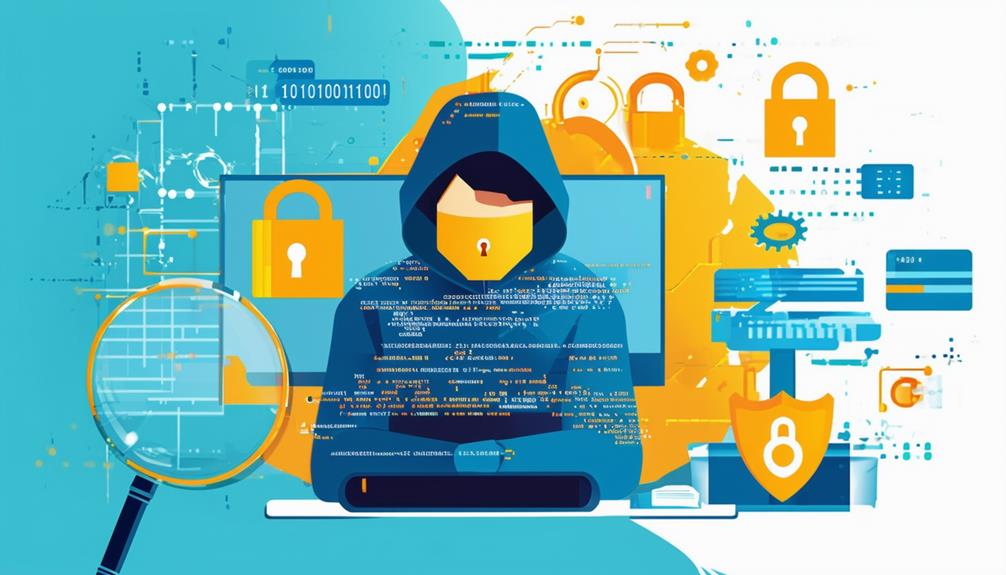Discover the foundational aspects of ethical hacking for cybersecurity expertise. Learn techniques from white-hat hackers to protect sensitive data efficiently. Understand offensive and defensive strategies against cyber threats, structured with phases like foot printing and vulnerability analysis. Prioritize data security through responsible practices, complying with legal regulations and continuous improvement suggestions. Explore principles such as confidentiality, integrity, and availability, vital for enhancing cybersecurity defenses. Encryption plays a key role in maintaining data confidentiality and integrity. Control access effectively, authenticate users, grant authorizations, and guarantee accountability for secure information handling. Explore the Cyber Killchain methodology for robust defense mechanisms. Access insights into security vulnerabilities and simulation of real-world cyber threats with ethical hacking techniques. Strengthen your cybersecurity skills effectively.
Key Takeaways
- Introduction to ethical hacking fundamentals and principles.
- Understanding responsible hacking practices and data security principles.
- Importance of data encryption and access control measures.
- Exploring the cyber killchain and ethical hacking techniques.
- Utilizing tools for penetration testing and vulnerability assessment.
Ethical Hacking Fundamentals
Understanding the core principles and practices of Ethical Hacking Fundamentals is essential for aspiring cybersecurity professionals and organizations seeking to enhance their security posture.
Introduction to Ethical Hacking involves the study of techniques employed by ethical hackers to assess and secure systems, networks, and data. Ethical hackers, also known as white-hat hackers, use their skills to uncover vulnerabilities in a legal and authorized manner, helping organizations identify and rectify potential security weaknesses before malicious hackers exploit them.
By grasping the motives behind hacking activities and the methodologies used, ethical hackers can effectively safeguard sensitive information, uphold data confidentiality, integrity, availability, and non-repudiation. Offensive information warfare techniques, like simulated attacks, aid in identifying weaknesses, while defensive strategies focus on detecting, preventing, and responding to cyber threats.
Ethical Hacking Fundamentals encompass a structured approach involving phases such as foot printing, scanning, enumeration, vulnerability analysis, and system hacking, following established methodologies like the Cyber Killchain for attack execution.
Responsible Hacking Practices

Responsible hacking practices necessitate the ethical exploration of system vulnerabilities to enhance cybersecurity defenses. When engaging in ethical hacking, it is essential to adhere to specific principles to make sure the process is conducted in a responsible and beneficial manner:
- Prioritize Data Protection: Ethical hackers must focus on safeguarding sensitive information and guaranteeing that data integrity and confidentiality are maintained throughout the testing process.
- Compliance with Legal Regulations: It is vital for ethical hackers to operate within the boundaries of the law and adhere to ethical guidelines when conducting security assessments.
- Continuous Improvement: Ethical hackers should not only identify vulnerabilities but also provide recommendations for enhancing security measures to fortify the organization's defenses against potential cyber threats.
Data Security Principles

Data security principles are fundamental in safeguarding sensitive information. They encompass ensuring:
- Confidentiality
- Integrity
- Availability
- Authenticity
- Non-repudiation of data
By understanding these principles, individuals can implement:
- Data encryption
- Access control measures
- Security policy compliance
These steps help enhance their organization's cybersecurity posture.
Data Encryption Importance
Encryption forms the backbone of safeguarding sensitive information by transforming it into an unreadable format for unauthorized individuals.
Here are three key reasons highlighting the importance of data encryption in information security:
- Data Confidentiality: Encryption guarantees that only authorized users with the decryption key can access the information, preventing unauthorized individuals from reading sensitive data.
- Data Integrity: By encrypting data, any unauthorized attempts to modify the information are detected, maintaining the integrity of the data and ensuring that it has not been tampered with.
- Data Authenticity: Encryption verifies the authenticity of the data by confirming that it has not been altered during storage or transmission. This helps in confirming that the information is genuine and has not been compromised by malicious actors.
Access Control Measures
Effective control over access to sensitive information is paramount in maintaining data security principles. Access control measures, a fundamental aspect of security controls, play a critical role in safeguarding data from unauthorized access.
Authentication, the process of verifying user identities, guarantees that only authorized individuals can access sensitive information. Authorization complements authentication by determining the specific level of access granted to each user, limiting their interaction with the data as per their roles.
Accountability, another key component, tracks and monitors user activities, making individuals answerable for any unauthorized actions taken. These measures collectively contribute to maintaining data confidentiality and integrity, reducing the risk of data breaches and unauthorized modifications.
For a certified ethical hacker, understanding and implementing robust access control measures are essential skills in fortifying the security posture of systems and networks against potential threats.
Security Policy Compliance
Adherence to established data security principles forms the foundation of maintaining robust security policy compliance within organizations. This guarantees that sensitive data is adequately protected against cyber threats.
Here are three key aspects to take into account in maintaining security policy compliance:
- Penetration Testing: Regularly conducting penetration testing helps identify vulnerabilities in the organization's systems and networks. By simulating real-world cyber attacks, organizations can proactively strengthen their security measures.
- Cyber Security Training: Providing thorough training to employees on cyber security best practices is essential for ensuring compliance with security policies. Educating staff members on how to recognize and respond to potential security threats can greatly reduce the risk of data breaches.
- Continuous Monitoring and Compliance Audits: Implementing continuous monitoring processes and conducting regular compliance audits help organizations stay vigilant against evolving cyber threats. By regularly evaluating adherence to security policies, organizations can adapt and reinforce their security measures to mitigate risks effectively.
Essential Information Security Concepts

Understanding essential information security concepts is fundamental for establishing a strong foundation in the field of ethical hacking. These concepts encompass confidentiality, integrity, availability, authenticity, and non-repudiation. Confidentiality ensures data protection, while integrity maintains data trustworthiness. Availability, authenticity, and non-repudiation play critical roles in data security, ensuring information is accessible, genuine, and irrefutable.
In the domain of ethical hacking, a solid grasp of social engineering and penetration testing is essential. Social engineering involves manipulating individuals to divulge confidential information, while penetration testing evaluates a system's security by simulating cyber-attacks.
Ethical hackers are responsible for safeguarding data and identifying vulnerabilities to enhance overall security measures.
Hacking Methodologies Overview

Building on the foundation of essential information security concepts, an in-depth exploration of hacking methodologies provides insight into the strategic approach hackers employ to exploit vulnerabilities and compromise systems. The scanning phase is a critical step in the hacking process, where hackers actively probe target systems for weaknesses. During this phase, they use various tools and techniques to identify potential entry points and gather information that will be crucial for the subsequent stages of the attack.
To gain a deeper understanding of hacking methodologies, consider the following:
- Foot Printing: This initial phase involves collecting general information about the target, such as IP addresses, domain names, and network architecture.
- Enumeration: In this stage, hackers dig deeper into the target system to gather specific details, such as user accounts, shares, and services running on the network.
- Cyber Killchain: This structured methodology breaks down the attack process into distinct phases, emphasizing the importance of each step from reconnaissance to establishing control over the target system.
Ethical Hacking Techniques

Exploring the domain of ethical hacking techniques provides valuable insights into the proactive measures used to identify and address security vulnerabilities. Ethical hackers employ a range of tools and techniques to simulate real-world cyber threats and protect organizations from malicious attacks.
These techniques include penetration testing, which involves evaluating systems, networks, and applications for vulnerabilities by attempting to exploit them in a controlled manner. Additionally, ethical hacking encompasses activities such as foot printing, scanning, enumeration, vulnerability analysis, and system hacking to uncover weaknesses before malicious hackers do.
Understanding the Cyber Killchain methodology, which involves stages like reconnaissance, weaponization, delivery, exploitation, and command and control, aids ethical hackers in preemptively securing systems. Attackers leverage tactics, techniques, and procedures to escalate privileges and move laterally within networks, highlighting the importance of robust defense mechanisms.
The MITRE ATT&CK Framework and the My3 Attack Framework offer detailed overviews of attack phases and strategies, guiding ethical hackers in fortifying systems against potential threats.
Frequently Asked Questions
Can You Teach Yourself Ethical Hacking?
Yes, self-teaching ethical hacking is achievable. With dedication, online resources, practice, and staying informed about cybersecurity trends, individuals can develop ethical hacking skills independently. Certifications and practical experience can validate expertise in this field.
What Should I Learn First for Ethical Hacking?
To initiate an ethical hacking journey, begin with a sturdy foundation in information security principles, hacker motives, hacking techniques, offensive and defensive strategies, and hacking methodologies. This knowledge will lay the groundwork for a successful exploration of ethical hacking.
Which Is the Best Website to Learn Ethical Hacking?
The best website to learn ethical hacking is Udemy. Their 'Introduction to Ethical Hacking' course boasts a 4.45 out of 5-star rating from 538 reviews and has attracted over 50 million learners. The course offers interactive lessons, projects, and quizzes.
What Is Ethical Hacker Salary?
Exploring the domain of ethical hacker salaries reveals a landscape where earnings vary dramatically. From an entry-level median of $71,000 to a seasoned professional's $105,000, factors such as experience, location, and industry influence compensation.
Conclusion
To sum up, ethical hacking is like a key that opens the door to understanding and protecting digital information.
By mastering the fundamentals, techniques, and methodologies of ethical hacking, individuals can safeguard data and uphold responsible hacking practices.
With a strong foundation in data security principles and information security concepts, one can navigate the complex world of cybersecurity with confidence and precision.
Start learning today to become a skilled ethical hacker and safeguard the digital world.









